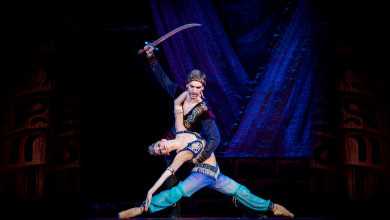CREDITS
Music by Fikret Amirov
Libretto by Maksud and Rustam Ibragimbekov
Choreography by Eldar Aliev
Set and Costume Designer: Pyotr Okunev
Lighting Designer: Sergei Martynov
Video Designer: Vadim Dulenko
Principal Coach: Alexander Kurkov
Coaches: Alexandra Arkhangelskaya, Sergei Zolotarev
One Thousand and One Nights (sometimes referred to as Arabian Nights) is a ballet in two acts by Fikret Amirov to a libretto by playwrights Magsud Ibrahimbeyov and Rustam Ibragimbekov, together with the choreographer Naila Nazirova and artist Togrul Narimanbekov. The libretto is based on episodes from One Thousand and One Nights, a collection of stories and folk tales compiled in Arabic during the Islamic Golden Age.
Synopsis
Act I
A powerful sultan and skillful hunter, Shakhriar is deeply in love with his wife, Nurida. The arrival of a party of the Sultan’s men signals a hunting expedition. Torn between his love for his wife and his affection for hunting, Shakhriar departs after Nurida persuades him to go.
Left alone, Nurida summons her slaves, and when Shakhriar unexpectedly returns, he finds his unfaithful wife in the arms of her favourite slave. Angered and humiliated, the outraged Sultan kills his wife, and condemns all of the other young women in the kingdom to death.
In the midst of the bloodshed, a beautiful young woman named Scheherazade suddenly appears. As death hovers above her head, Shakhriar, overwhelmed by her beauty, intervenes and temporarily delays the execution.
Act II
Scheherazade convinces Shakhriar to listen to her stories and to delay the executions as long as he is entertained. Shakhriar agrees to the condition, and Scheherazade proceeds to tell stories that illustrate the wisdom, beauty, and loving characteristics of women.
 Mariinsky Theatre:
Mariinsky Theatre:  Mariinsky-2 (New Theatre):
Mariinsky-2 (New Theatre):  Mariinsky Concert Hall:
Mariinsky Concert Hall: 

